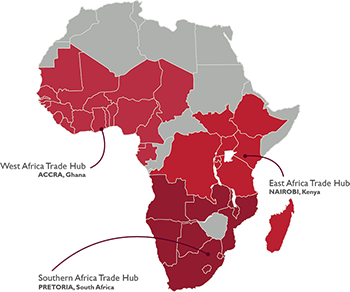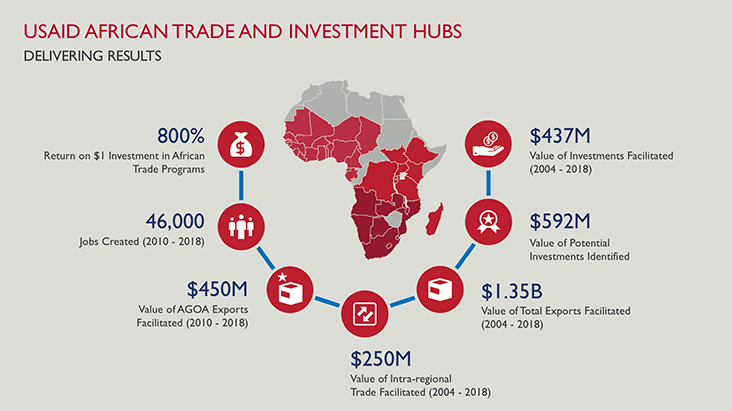- Where We Work
- Africa
- African Union
- Power Africa
- Trade and Investment
- Angola
- Benin
- Botswana
- Burkina Faso
- Burundi
- Cameroon
- Central Africa Regional
- Central African Republic
- Chad
- Côte d'Ivoire
- Democratic Republic of the Congo
- Djibouti
- East Africa Regional
- Eswatini
- Ethiopia
- Ghana
- Guinea
- Kenya
- Lesotho
- Liberia
- Madagascar
- Malawi
- Mali
- Mauritania
- Mozambique
- Namibia
- Niger
- Nigeria
- Republic of the Congo
- Rwanda
- Sahel Regional
- Senegal
- Sierra Leone
- Somalia
- South Africa
- South Sudan
- Southern Africa Regional
- Sudan
- Tanzania
- The Gambia
- Uganda
- West Africa Regional
- Zambia
- Zimbabwe
- Asia
- Europe and Eurasia
- Latin America and the Caribbean
- Middle East
- Mission Directory
Speeches Shim

USAID Trade Hubs work on the ground to reduce the cost and risk of doing business in Africa, leveling the playing field and cutting through red tape to make investment and trade freer and fairer for everyone. USAID is engaging with partners across sub-Saharan Africa to:
- Deepen regional economic integration
- Promote two-way trade with the U.S. under the African Growth and Opportunity Act (AGOA)
- Attract investment that drives commercial expansion within the region and to global markets
USAID's Trade and Investment Hubs are located in East Africa, Southern Africa and West Africa. North Africa Trade Hub coming soon!
Did You Know?
- Africa’s rate of return on investment is higher than any other region. The Hubs have created investment opportunities in Africa worth $600 million—and growing.
- The Hubs are spearheading a new model of private-sector led development. For every $1 of public money spent on trade programs in Africa, the Hubs leverage $9 in private investment.
- Trade grows the U.S. economy by generating new markets for American goods and services. American companies exported nearly $22 billion in goods to Africa in 2017.
- AGOA is the cornerstone of U.S. trade policy with Africa. The Hubs have directly leveraged $1.3 billion in African exports under AGOA.
- Since 2010, the Hubs have created 46,000 African jobs. Many of these jobs are held by women who tend to invest job-related income into their families and communities.
- Since 2004, the Hubs have assisted 2,300 private enterprises and non-governmental organizations working on food security.

USAID African Trade and Investment Hubs: Delivering Results

Comment
Make a general inquiry or suggest an improvement.